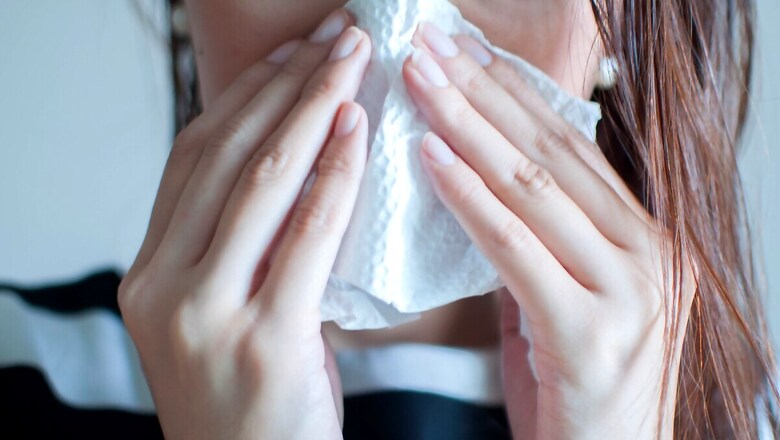
views
Are you sneezing, coughing or suffering from runny nose too often these days?
Amid frequent weather changes, there has been a notable increase in patients seeking treatment for seasonal allergies at both hospital outpatient departments (OPDs) and local clinics.
The most commonly experienced symptoms are sneezing, itchiness in the nose or throat, nasal congestion, runny nose, itchy and watery red eyes, coughing, wheezing and shortness of breath. Doctors also indicated that several cases coming up overlap with flu and allergies.
“The allergies are quite common these days, and I have been seeing 20-25% of my OPD patients presenting allergy-related issues,” Dr Rajeev Gupta, director of internal medicine at the CK Birla Hospital, Delhi told News18.
Dr Ravi Shekhar Jha, head of the department, pulmonology, Fortis Escorts Hospital, Faridabad is also seeing almost seven new patients for respiratory allergies every week.
He has been advising skin prick tests instead of blood tests to his patients when required. “This is very accurate and helps in identifying the common allergen and at times with the help of immunotherapy, the impact of these allergens on the human body can be mitigated.”
Similarly, Dr Anirvan Karmakar from Narayana Hospital in Howrah, West Bengal, believes that allergy among Indians is a “growing concern”.
“During the onset of the summer season, people are vulnerable to several allergies that often include pollen allergies, commonly from trees, grasses, and weeds,” Karmakar said, adding that “daily, a considerable number of patients are diagnosed with seasonal or general allergies, especially during peak allergy seasons such as March-April. We are treating 1-2 patients every day.”
Doctors recommend avoidance measures such as staying indoors during peak pollen times, using air purifiers, wearing masks outdoors, and taking over-the-counter antihistamines or nasal steroids to relieve symptoms.
What Leads to Seasonal Allergies?
Seasonal allergies can develop at any age, without a previous history of allergies, experts said.
Allergies commonly seen in the current weather are referred to as seasonal allergies, also known as “hay fever” or seasonal allergic rhinitis. These symptoms occur during specific times of the year, typically when trees, grasses, and weeds release pollen particles into the air.
In March, common allergens include pollen from trees like neem and oak, which can trigger allergic reactions. Additionally, dust and pollution may contribute to respiratory allergies during this time.
“When these allergens enter the bloodstream of sensitive individuals, they trigger the release of histamines, causing allergy symptoms,” explained Dr Tushar Tayal, lead consultant, Department of Internal Medicine, CK Birla Hospital in Gurugram.
To relieve respiratory allergies, it’s crucial to reduce environmental triggers by using air purifiers, keeping doors closed, and reducing exposure to irritants like burning wood and incense.
While medications such as antihistamines and steroids can provide relief, it’s essential to use them under medical guidance. Also, home remedies like wearing masks outdoors and staying hydrated.
Which are the Lethal Allergies?
While most allergic reactions are mild, causing discomfort like sneezing, itching, or rashes, some can be life-threatening. Certain food allergies such as shellfish, prawns, peanuts, and eggs, or allergies to certain medications like antibiotics and painkillers can lead to a life-threatening allergic condition known as anaphylaxis.
“Anaphylaxis is a serious medical emergency characterised by symptoms such as itchy rash, throat swelling, shortness of breath, vomiting, light-headedness, loss of consciousness, low blood pressure, and shock,” said Dr Neeraj Gupta, an allergist consultant at the Department of Paediatrics, Sir Ganga Ram Hospital, Delhi.
“Treatment typically involves epinephrine injection, intravenous fluids, and placing the individual in a reclined position with elevated feet to restore normal blood flow.”
Other reasons for suffering anaphylaxis could be reactions to blood components during blood transfusion and the use of anaesthetics and muscle relaxants during surgery can cause anaphylaxis.
US FDA’s First Drug for Allergies Useful?
Many of the experts quoted above told News18 that patients approached them seeking a prescription for the world’s first drug approved by regulatory authorities for reducing allergic reactions to multiple foods after accidental exposure.
US FDA approved Xolair, which is a brand name for the chemical salt Omalizumab, on February 16 for reducing the risk of anaphylaxis, which may occur with accidental exposure to one or more foods. The drug was originally approved in 2003 for the treatment of moderate to severe persistent allergic asthma in certain patients.
The drug works by targeting and blocking a specific type of antibody, immunoglobulin E (IgE), that plays a key role in allergic reactions. By reducing IgE levels, Omalizumab helps prevent the lethal side effects, that could lead to the death of the patient.
The medication is particularly effective in treating, severe sinusitis, allergic rhinitis or hay fever, moderate to severe forms of eczema characterized by itchy, inflamed skin and multiple food allergies.
“Omalizumab may offer relief to some individuals struggling with multiple food allergies, but an omalizumab trial is necessary to assess the individual’s response,” Gupta from CK Birla Hospital said, adding that “overall, Omalizumab provides a targeted approach to managing various allergic conditions, improving the quality of life for patients experiencing moderate to severe symptoms.”
However, the drug is injectable and can be prescribed where IgE levels in the blood are raised and the doctor ascertains the allergic problems in this patient are IgE-related only.
It is specifically designed to reduce the risk of allergic reactions, including anaphylaxis, in certain adults and children aged one year or older.
But in India, experts believe that preventive medicine would remain out of pocket for the masses due to its high cost which is around Rs 32,590.
“We can only prescribe this to those who can afford it. Xolair can have side effects and patients prescribed Xolair should continue to avoid foods they are allergic to and take the medication repeatedly every few weeks,” said Karmakar from Narayana Hospital.


















Comments
0 comment